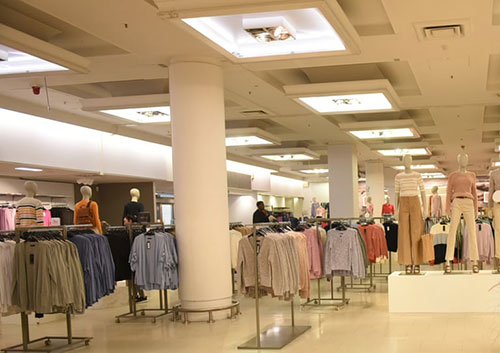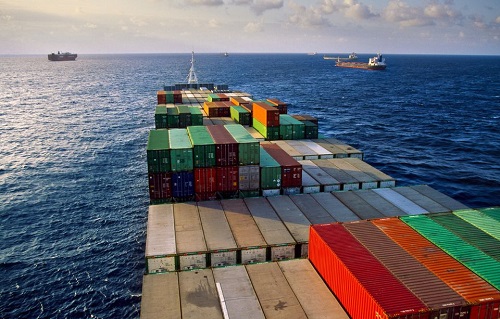FW
Eurostat data shows the European textile and clothing manufacturing went through a difficult year in 2019, despite good retail sales and export performances. This trend will worsen in 2020 due to the Coronavirus outbreak. An ongoing Euratex poll with members show 80 per cent companies are already laying off workers; more than half of them expect a drop in sales and production by over 50 per cent.
The outlook for 2020 is expected to worsen due to the virus’ outbreak, as in March 2020 industry confidence fell dramatically. Euratex is conducting a survey among European companies: preliminary results indicate that more than half of the companies expect a drop in sales and production by more than 50 per cent. Moreover, almost 9 out of 10 companies face serious constraints on their financial situation and 80 per cent of companies is temporarily laying off workers. 1 out of 4 is considering closing down the company.
The Tirupur Exporters’ Association (TEA) says, garment industry in Tirupur, which has over 10,000 manufacturing units, is facing the worst time ever. The garment clusters that employ over 6 lakh people is staring at a loss of over Rs 10,000 crore in just three months. For both the small and big firms, the road to revival seems difficult.
As per Raja Shanmugham, President TEA revealed, Tirupur exports industry used to see a turnover of Rs 2,500 crore per month on an average, but the units have not yet received their payment dues for January and February. As COVID-19 affected the EU, Canada and other markets, the brands have not made our payments. Besides, the shipments released in March are right now on high seas or lying at the ports.
Even the domestic market, which is also worth Rs 2,500 crore a month, is affected. The business hub of Tamil Nadu is wearing a deserted look. The chances of its revival depend solely on government patronage as most firms have bank loans and insufficient working capital.
The association has requested the government for a moratorium of at least one year. “It’s clear that in next three months we won’t get any major export orders as coronavirus has battered economies globally. It has also requested the government to infuse at least 25 per cent of working capital into the industry.
Madewell has announced long-term commitments to further its sustainable practices across key areas of the business and in connection with Earth Day in April. The brand’s sustainability initiatives include production, supply chain, retail and corporate culture, as the company deepens its commitments to better materials, its existing Fair Trade USA partnership, packaging and carbon usage.
Several goals and commitments were announced for 2025 and 2030. For starters, 100 per cent of key fibers used in all of Madewell’s materials will be sustainably sourced and free of virgin plastics, including more sustainable cotton, synthetics, cellulosics, wool and leather. To date, 60 per cent of Madewell’s spring collection incorporates sustainable materials.
Madewell will continue to expand its partnership with Fair Trade USA and will have at least 90 per cent of its denim confirmed as Fair Trade Certified. Madewell added four Fair Trade Certified denim factories in the past few months and has now nominated 10 additional factories to be certified in the near future. Among the existing ones is the Saitex factory in Vietnam, which prioritizes renewable energy, washes efficiently, air dries and turns its manufacturing waste into bricks for affordable housing.
In addition, 100 per cent packaging materials will be sustainably sourced and free of virgin plastics by substituting recycled and alternative sources. Madewell will also ensure that all operations in company-owned and operated facilities are carbon neutral by 2030.
To kick off these commitments, Madewell has added new Spring styles to the brand’s Do Well Shop featuring sustainably made pieces to Fair Trade certified denim. They include a tie-dyed jean jacket, denim short overall, a midi dress and cardigan.
ACT signatory brands have expressed their commitment to maintain responsible business practices and social dialogue with union representatives from IndustriALL Bangladesh Council (IBC) and the Bangladesh Garment Manufacturers and Exporters Association (BGMEA), amid the corona virus outbreak.
In majority of garment factories in Bangladesh, workers are yet to receive their due payments for March. Union leaders in the IBC stress that workers are vulnerable, as many factories are closing over fears of the virus outbreak, and in some cases laying off workers.
The IBC is urging brands to pay for orders that are wholly or partially completed, and if possible to consider paying in advance. According to BGMEA, 907 million apparel pieces worth $2.87 billion have been cancelled or suspended by brands and buyers that source from Bangladesh. This has a direct impact on the 2.09 million workers in the country’s textile industry.
If brands don’t take ownership of items already produced and ready to be shipped and pay at least the production cost of orders in the process of being manufactured, it will be nearly impossible for employers to pay workers’ wages.
Major U.S. retailers Macy's Inc , Kohl's Corp and Gao plan to furlough tens of thousands of employees, as they prepare to keep stores shut for longer to curb the spread of COVID-19.
Kohl's would also suspend its share repurchase program, evaluate its dividend plan and draw down $1 billion from an existing credit line, joining a growing list of companies seeking to shore up their cash reserves to weather the financial hit from the health crisis.
Macy's and Gap have suspended their dividends and have also tapped into their credit facilities. Kohl's furloughed employees would continue to get health benefits. Macy's specified that employees enrolled in health benefits will continue to receive coverage, at least through May.
Macy's would maintain the "absolute minimum" workforce needed to maintain basic operations across its Macy's, Bloomingdales and Bluemercury brands. The retailer would have fewer furloughs in its digital business, supporting distribution centers and call centers, while Kohl's would start buy online and pick up-at-store services later this week.
India has urged countries with which it has free trade agreements (FTAs) to allow import of goods now without certificate of origin as domestic authorities are currently not issuing the document on account of the ongoing lockdown. Exporters have to submit that certificate at the landing port of the importing country to claim duty concessions under FTAs.
The certificate helps in checking dumping of cheap and sub-standard goods from a third country. The request was notified in a trade notice by the Directorate General of Foreign Trade (DGFT).The certificates would be issued retrospectively by the concerned Indian agencies after they open their offices. Therefore, in the interim period, the customs authorities and other competent authorities in the trading partners with whom India has a trade agreement may kindly allow the eligible imports under preferences on a retrospective basis subject to the subsequent production of the certificates of origin by the Indian exporters.
The notice said, India would also honor its preferential trade agreement imports, subject to the respective governments also making a formal request or putting up a notice in this regard for accepting these certificates on retrospective basis. Under these trade agreements, two or more trading partners significantly reduce or eliminate import duties on maximum number of goods traded between them. India has implemented such agreements with the Association of Southeast Asian Nations (ASEAN), Singapore, South Korea, Japan, Sri Lanka, Thailand and Malaysia.
The National Council of Textile Organizations (NCTO has criticised administration’s plan to institute a 90-day deferral on MFN tariffs. NCTO believes the reported plan being pushed by importing and retailing industries would defer certain tariffs, including those on finished apparel products. It is an ill-advised policy that will hurt the US textile industry at a time it is answering the call of the nation to produce medical supplies to battle the COVID-19 pandemic.
NCTO has been at the forefront of efforts to deploy resources, converting production lines to manufacture urgently needed medical supplies like face masks and their textile components, to address the critical need for personal protective equipment and other medical and sanitation supplies in the fight against the coronavirus. These unnecessary tariff concessions would benefit importers and retailers at the direct expense of manufacturers on the front lines of the COVID-19 response and send a demoralizing message.
Tariff deferrals would severely exacerbate ramifications for the US economy, manufacturers and workers and open the floodgates for imports. If the US government makes tariff concessions during this crisis, it will be inviting a virtual tsunami of imports further devastating domestic manufacturing as it attempts to regain its footing.
 As both retailers and consumers are grappling with the effects of COVID-19, rental platforms like Rent the Runway and RealReal are also facing a shortage of orders. Demand for rented work wear and occasion wear is drying up as conferences, weddings and other events are being canceled across the board. This can be noted from the example of Nova Octo, an evening wear rental service, whose new rentals dipped by more than 90 percent last week. The supplies of resellers like The RealReal and Vestiaire Collective, are also affected as stores remain closed. This is likely to delay future consignment processing times of these sellers by up to four weeks.
As both retailers and consumers are grappling with the effects of COVID-19, rental platforms like Rent the Runway and RealReal are also facing a shortage of orders. Demand for rented work wear and occasion wear is drying up as conferences, weddings and other events are being canceled across the board. This can be noted from the example of Nova Octo, an evening wear rental service, whose new rentals dipped by more than 90 percent last week. The supplies of resellers like The RealReal and Vestiaire Collective, are also affected as stores remain closed. This is likely to delay future consignment processing times of these sellers by up to four weeks.
Similarly, Vestiaire Collective is facing an inventory build up as many customers are depositing their old clothes in these stores. The Paris-based company closed its New York warehouse over the weekend as per Governor Andrew Cuomo's executive order for all non-essential workers to stay home. However, the company is seeing an increased visitor turnout on its shopping app.
As per managing director of of GlobalData Retail, Neil Saunders, during these times, shoppers that use rental and resale services, may have less disposable income hence, they are likely to cut non-essential purchases out of their spending habits.
Though New York City-based rental service, Rent the Runway, is yet to see members pause and cancel the service en masse. However, some of its competitors like the Seattle-based Armoire have been recording a significant number of cancellations since the last two weeks.
Despite such instances, online shopping may increase due to the growing work-from-home culture. As retail customer service platform Hero reveals, in the second week of March, e-commerce purchases made between the hours of 9am and 6pm jumped 52 percent compared to the same period last year. Rental users, in fact, are embracing dressing up at home rather than for the office.
 As the dark clouds of Covid 19 continue to hang over global economy, the situation in global apparel sourcing and trade is worsening. From lack of raw materials, the industry is rapidly shifting to orders being cancelled. With stores across the EU, US, Asia being shut, retailers are being forced to either postpone or cancel their sourcing orders.
As the dark clouds of Covid 19 continue to hang over global economy, the situation in global apparel sourcing and trade is worsening. From lack of raw materials, the industry is rapidly shifting to orders being cancelled. With stores across the EU, US, Asia being shut, retailers are being forced to either postpone or cancel their sourcing orders.
Trade volume to be hit
This situation is similar in three regions recently studied by Global Trade Analysis Project Recursive Dynamic (GTAP-RD) Model. Economies of these regions, namely, China, USA, and EU are likely to be hit harder than the rest of the world.
Firstly, the volume of world apparel trade in all these three regions is likely to be hit hard by Covid-19. Especially, demand for apparels in the EU and US is expected to drop sharply as clothing stores are forced to shut down and consumers are losing jobs and struggling financially.
China to be the worst sufferer
Secondly, the sharp decline in imports by EU and US will hit China hardest as the country will record a significant drop in apparel exports. One of the most important reasons for this is the large volume of its exports. As China is the largest source of US and EU apparel imports, it is often used to fulfill large-volume sourcing orders. However, many retailers are likely to cancel these large-quantity orders, which will result in a disproportional loss of China’s apparel exports. Secondly, China exports all major categories of apparels to the US and EU. This makes it the most vulnerable to order cancellation.
important reasons for this is the large volume of its exports. As China is the largest source of US and EU apparel imports, it is often used to fulfill large-volume sourcing orders. However, many retailers are likely to cancel these large-quantity orders, which will result in a disproportional loss of China’s apparel exports. Secondly, China exports all major categories of apparels to the US and EU. This makes it the most vulnerable to order cancellation.
Almost 60 per cent of Bangladesh orders cancelled
Besides China, apparel exports from Bangladesh will also be hit. The country is a leading apparel supplier to both the EU and US markets. This makes it more exposed to order cancellations. As the country is a beneficiary of the EU Everything But Arms (EBA) program, around 60 per cent of its apparels are exported to EU. In comparison, Vietnam has a more diversified export market, its apparel factories have more flexibility to mitigate the impact of a fall in import demand from the EU and the US.
Job losses to mount
Thirdly, the declining apparels imports by US and EU have a notable impact on employment in many apparel exporting countries. Even a 10 per cent decline in imports by these countries can result in a decline of a 4 to 9 per cent decline in garment employment. Therefore, if imports by these nations decline by 10 per cent in 2020, leading apparel exporting countries such as Bangladesh, Vietnam, Cambodia and India may lose around 4 to 9 per cent of their jobs in the garment sector. The apparel sector is the largest job creator for the local economy in developing countries such as Bangladesh and Cambodia. Therefore, the social and economic impact of job losses in the apparel sector in these countries is very concerning.
Lastly, even if the spread of COVID-19 is controlled by the second part of the year, global apparel supply chain could continue to face turbulent times for the next one or two years. Even if apparel imports by the EU and US recover to its normal level in 2021, importers and garment factories may have to face difficulties such as acute labor shortage, increase in prices of raw material and a lack of production capacity.
Dilip Gyanchandani, Country Manager, India, Wool Mark Company
 From the textile and garment industry prospective there would be short- to mid- term business impact on volumes as due to the lockdown working factories have come down to minimum production levels. From September onwards, normalcy should be restored but it will take about three to four months for the industry to bounce back. Things are looking good now but it is an uncertain period and is difficult to say something at this stage because it looks like we are containing the pandemic.
From the textile and garment industry prospective there would be short- to mid- term business impact on volumes as due to the lockdown working factories have come down to minimum production levels. From September onwards, normalcy should be restored but it will take about three to four months for the industry to bounce back. Things are looking good now but it is an uncertain period and is difficult to say something at this stage because it looks like we are containing the pandemic.
We at Wool Mark in India are working from home. As usual, we are connected with partners and providing online and digital information. At this point, they have enough time to go through the digital courses to study fiber, our product and development and wool as and when they are free. We are also ensuring all our staff globally are safe at home and are inter connected to create a positive environment.
In the near short to midterm there would be an impact on business because there will be a disruption in global supply chain. Most countries are now fighting the pandemic. At the moment, I don’t see any difficult time zones for the next six weeks. I believe from the end of April to mid May things will start recovering if everything goes well. Our financial year starts from July, hopefully in the coming financial year, we should be able to do good and be able to come out of this crisis.
Two things emerge clearly for garment brand owners. Firstly, a slowdown is acceptable but a lockdown is something that has never happened and this has created a huge impact on the textile and garment. These are life’s learning. There will be more sustainable demand and business in future which will drive the goal but it would be in a balanced fashion.












